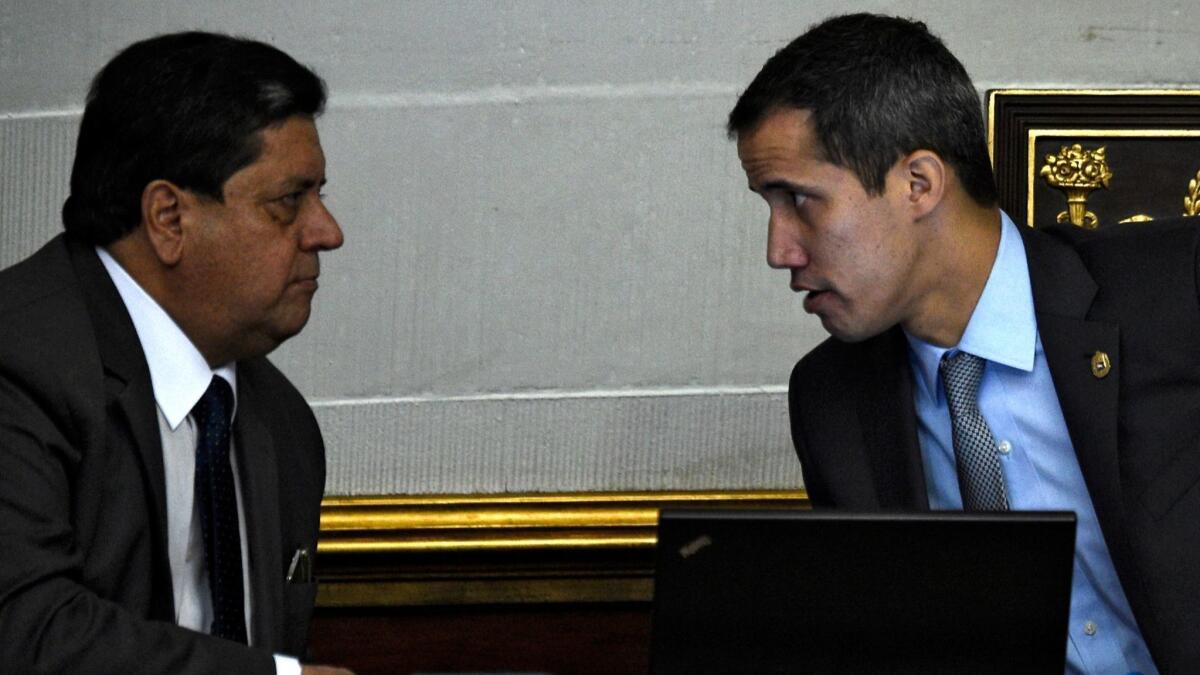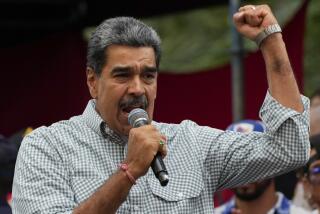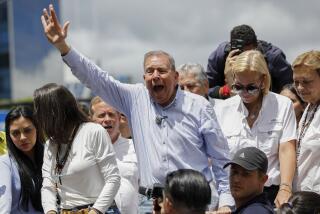Venezuelan lawmaker’s arrest by Maduro government officers condemned by several nations

Reporting from Caracas, Venezuela — Several nations on Thursday condemned the arrest by Venezuelan government intelligence officers of a high-level politician associated with opposition leader Juan Guaido, calling the move by President Nicolas Maduro arbitrary and unconstitutional.
The arrest came a week after a failed attempt by Guaido and his supporters to get the nation’s military to rise up against Maduro.
For the record:
4:40 p.m. May 9, 2019An earlier version of this report referred to Adm. Craig Faller as Craig Fuller.
Edgar Zambrano, one of the opposition-controlled National Assembly’s two vice presidents, was arrested Wednesday night in east Caracas as he left his party’s headquarters.
After Zambrano refused to leave his car, which security officials had surrounded, the vehicle was towed to an undisclosed location with Zambrano inside.
Zambrano managed to send a message over social media during the confrontation, saying officials were using a tow truck “to forcibly transport us to the Helicoide,” a prison in south Caracas used to house political prisoners.
Assembly members have immunity to prosecution under the Venezuelan Constitution but the Maduro-controlled constitutional assembly, a rival congress set up to neuter the power of the lawfully elected National Assembly, stripped Zambrano and six other members of that legal shield on Tuesday. Three more assembly members lost their immunity Wednesday.
Hours before the arrest, the Maduro-controlled Supreme Court charged Zambrano and the nine other assembly members with treason, conspiracy and rebellion, among other charges, in connection with April 30 demonstrations in which Guaido unsuccessfully called upon the armed forces to abandon Maduro and support him as Venezuela’s leader.
Guaido, the National Assembly president, in January declared himself the poverty-stricken country’s interim president, saying Maduro’s presidency was illegitimate because of a fraudulent election. Guaido is backed by more than 50 nations, including the United States.
In a statement Thursday, the Lima Group, a coalition of 14 countries that share an interest in the Venezuelan crisis, said Zambrano’s arrest “is an affront to democratic principles and human rights recognized by international law.” Several countries in the Lima Group have absorbed thousands of Venezuelan refugees who have fled the country in recent years.
“The arrest is null and void because according to the Venezuelan constitution the only organ that can lift legislative immunity is the National Assembly,” the statement said.
U.S. Secretary of State Michael R. Pompeo called the arrest “an unacceptable and illegal act that is yet another reflection of the repression of the former Maduro regime.”
“This assault on the National Assembly should serve as a clarion call to the region and the world that the dictatorship is not interested in constitutional solutions to the Venezuelan people’s problems,” Pompeo said in a statement. “Zambrano must be released immediately.”
The place where Zambrano said he was being taken, the Helicoide, is an unfinished complex of office buildings that was converted into a prison of the national secret police, known by its Spanish initials, SEBIN. Other political prisoners taken there have been tortured, human rights groups allege.
Guaido said Wednesday night that “repression and fear would not defeat us.”
“The regime persecutes us because now it doesn’t govern, doesn’t have authority or respect. Its only answer is to persecute those who dare to show their faces,” Guaido said during a rally in Vargas state.
As of midday Thursday, none of the other nine assembly members charged with treason and rebellion was known to have been arrested. Among those charged is Henry Ramos Allup, who held Guaido’s job as National Assembly president in 2016.
Zambrano was arrested shortly after the U.S. lifted sanctions against SEBIN’s former director Manuel Ricardo Cristopher Figuera, who is believed to have been the official who authorized the release of opposition leader Leopoldo Lopez from house arrest on the morning of April 30, allowing him to take part in protests against Maduro. Figuera’s whereabouts are unknown.
Michael Dobson, former senior sanctions policy advisor in the U.S. Treasury Department’s Office of Foreign Assets Control, said the sanctions were lifted because Figuera “recently broke ranks with the embattled president.”
White House scrambles on Venezuela after major setback »
“The U.S. lifted sanctions on former Venezuelan spy chief Gen. Manuel Cristopher Figuera this week, seeking to encourage further defections from Pres. Maduro’s regime,” Dobson said in an email to The Times.
Lopez, a former Caracas borough mayor and leading opposition figure, was arrested and jailed in 2014 on suspicion of inciting violence and placed under house arrest in 2017. Maduro wants Lopez rearrested, but he has taken refuge as a guest in the Spanish Embassy in Caracas.
Also on Wednesday, Venezuelan Defense Minister Vladimir Padrino rejected U.S. Southern Command chief Adm. Craig Faller’s recent call on Venezuela’s military to back Guaido.
“Adm. Faller, don’t underestimate the military honor that accepts neither blackmail manipulation, intimidation, nor the deceptive offers from imperial agents and their puppets,” Padrino said Wednesdayon state TV.
Special correspondents Mogollon and Kraul reported from Caracas and Bogota, Colombia, respectively. Staff writer Tracy Wilkinson in Washington contributed to this report.
More to Read
Sign up for Essential California
The most important California stories and recommendations in your inbox every morning.
You may occasionally receive promotional content from the Los Angeles Times.










